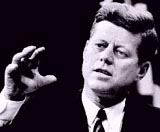|
More People |
|||||||||||||||||||
|
|
|||||||||||||||||||
|
|||||||||||||||||||
|
|
|||||||||||||||||||
|
Biography | Speech |
||||||
|
John F. Kennedy was born on May 29, 1917, in Brookline, Massachusetts. After graduating from Harvard University, he joined the Navy. He gained fame there then returned home, eventually becoming a Senator. Kennedy beat Richard Nixon in 1961, becoming US President. His running mate was Lyndon Johnson, who would take over in a couple years.
The previous president had been Dwight Eisenhower, who had already taken an anti-Castro stand. Eisenhower had authorized the CIA to begin training and arming Cuban exiles to invade Cuba, with the hope of overthrowing Fidel Castro and assuming power. The Bay of Pigs invasion was a total failure, principally because of naivete on the CIA's part.Although he did not approve of the attack, Kennedy had given the go-ahead. However, he refused to let the US air force become involved (though Castro keeps the body of a CIA pilot involved in the attack frozen as proof that US Government officials took part). Another major event during the Kennedy presidency was the Cuban Missile Crisis. As a result of the invasion, frequent assassinations attempts on Castro, and placement of US nuclear missiles very near the Soviet Union, Nikita Khrushchev placed Soviet nuclear missiles in Cuba.U.S. spy planes flying over Cuba spotted the warheads, and Kennedy protested angrily to the Soviet Union. His advisors told him to invade Cuba, but he did not, fearing it would lead to an all-out nuclear war. Instead, Kennedy set up a military blockade of Cuba and began negotiating with Khrushchev to remove the missiles. Though the placement of the missiles wasn't militarily signicant, it was highly symbolic. Kennedy gave a televised speech and made the missile crisis into a public issue.Eventually, the Soviets removed the missles from Cuba. In exchange, the US agreed not to invade Cuba, and in a lesser known provision, agreed to take its offensive missiles out of Turkey. Kennedy was assassinated on November 22, 1963. The Warren Commission found that no conspiracy took place, but many believe this to be false; some even think that Fidel Castro may have been involved. |
||||||
 During his life, John F. Kennedy became the United State's youngest President, and one of
During his life, John F. Kennedy became the United State's youngest President, and one of